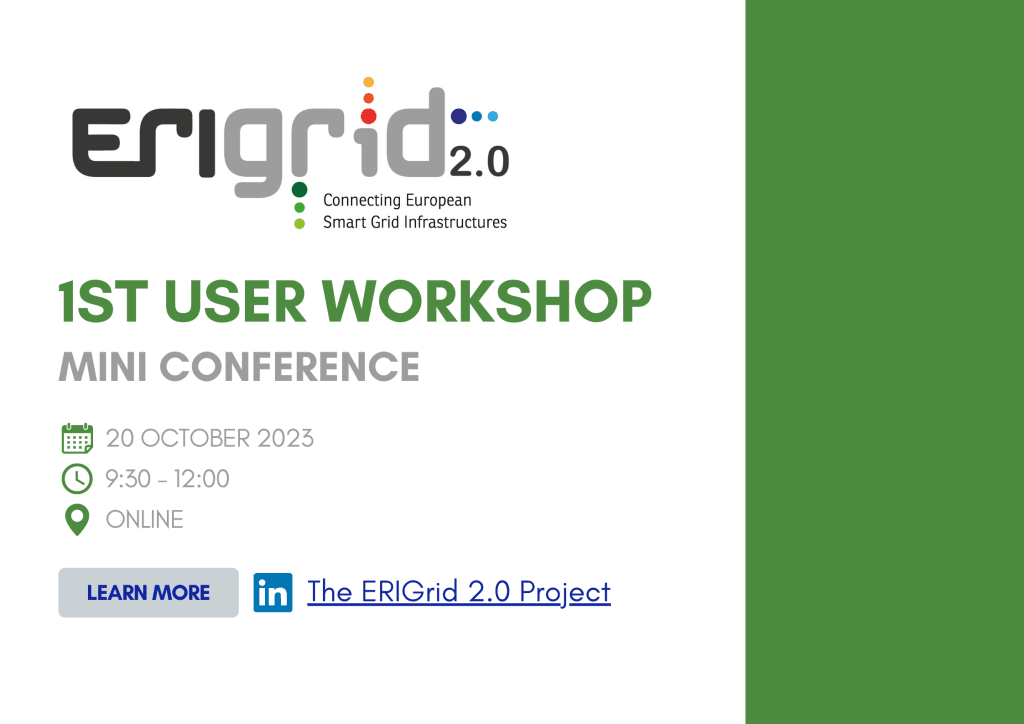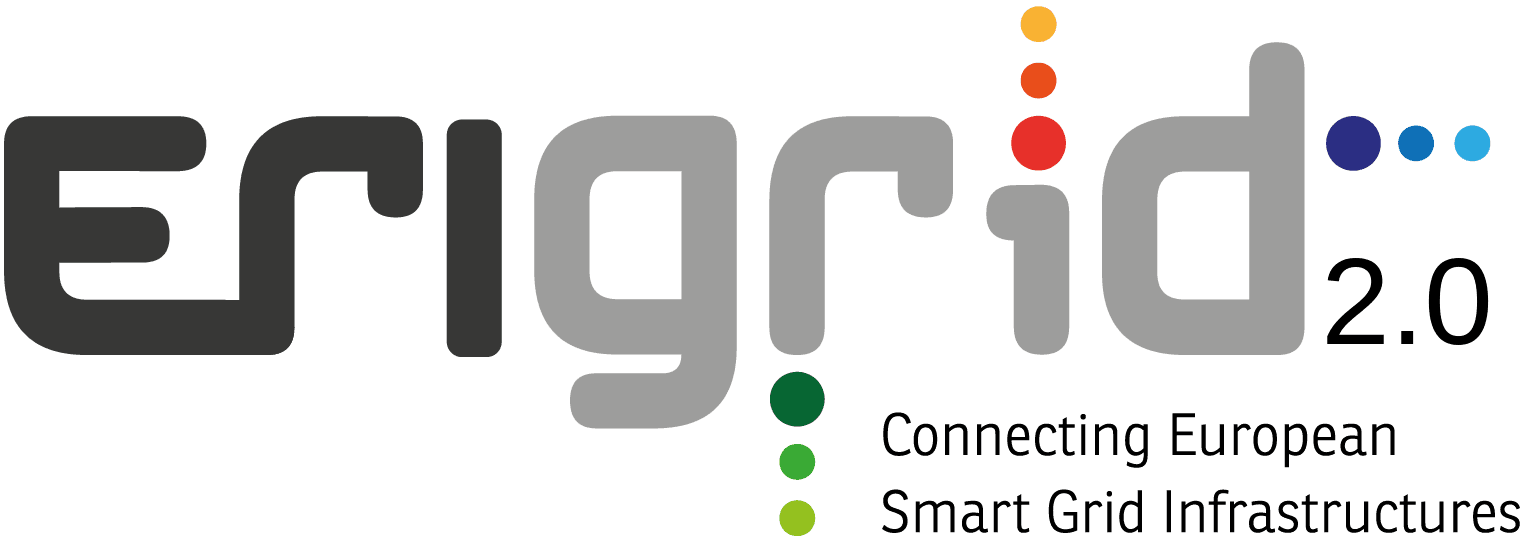1st user workshop

Message from the Organizers
What will Europe’s energy system look like in 10 years? The 2030 targets for decarbonising the EU economy have been agreed. The transition is underway. The integration of renewable energy resources and turning the existing power system into a smart grid are among the top goals. The EU-funded ERIGrid 2.0 project will address the challenges of the energy transition by widening and advancing access to European research infrastructure. Serving as a single-entry point for researchers, engineers and practitioners who are active in smart grids and energy systems as well as the in integration of renewables, the project will develop a broad spectrum of improved services, methods and tools based on the outcomes of the predecessor projects DERri and ERIGrid.
As a pan-European research infrastructure (RI), that integrates 21 first-class laboratories located in 13 European countries, ERIGrid 2.0 offers interested researchers, engineers, and practitioners free-of-charge access to laboratories and associated services along with logistical, technological and scientific support for their own experimental research.
This first user workshop provides the opportunity for six selected user groups (out of around 50 realised access projects) to present their results and findings from the laboratory access program.
Chairs
J. Emilio Rodriguez and Thomas Strasser
Workshop Organisers
Chairs
- J. Emilio Rodriguez (TECNALIA Research & Innovation, Spain)
- Thomas Strasser (AIT Austrian Institute of Technology, Austria)
Organisation and Publicity Chairs
- Greta Meshi (DERlab e.V., Germany)
- Leonard Ramos (DERlab e.V., Germany)
Technical Committee
- Mihai Calin (AIT Austrian Institute of Technology, Austria)
- Joseba Jimeno (TECNALIA Research & Innovation, Spain)
- Santiago Sanchez Acevedo (SINTEF Energy Research, Norway)
- Salvatore d’Arco (SINTEF Energy Research, Norway)
- Federico Coffele (University of Strathclyde, UK)
- Ibrahim Abdulhadi (University of Strathclyde, UK)
Program Overview
Presentation 1
- Title: Overview of ERIGrid 2.0 and its Research Infrastructure Access Activities
- Presenter: Thomas Strasser, J. Emilio Rodriguez
- Abstract: This talk introduces the ERIGrid 2.0 project, its linked access possibilities, and it provides an overview of this first user workshop.
Presentation 2
- Title: Cyber attack in PV system for voltage regulation in distribution network (CybTEST)
- Presenter: Seema Yadav
- User Group: Motilal Nehru National Institute of Technology (MNNIT) Allahabad (India)
- Host Lab: IntelligentEnergy Testbed (VTT), Finland
- Abstract: A cyber-physical attack (CPA) is a form of assault that targets the interconnected systems of a smart grid, such as power networks. In this project, switching sliding mode attack construction was involved by changing the status of circuit breaker to enforce the state variables of power network towards instability in a particular form of manifolds. The start-time and stop-time was selected such that the intruder applies the attack in a swiftly and stealthy manner. The real-time simulations were conducted in RTDS using RSCAD with switching attack algorithm implemented from MATLAB software. The successful implementation of attack algorithm suggested its commendable yet disastrous nature on leading to generator instability.
Presentation 3
- Title: Performance Analysis of PV Integrated Distribution Network with combination of Different Control Strategies and Communication Network (PERFECT)
- Presenter: Anju Yadav
- User Group: Motilal Nehru National Institute of Technology (MNNIT) Allahabad (India)
- Host Lab: IntelligentEnergy Testbed (VTT), Finland
- Abstract: Integration of large scale of distributed photovoltaic (PV) generation resources in the distribution network can lead to technical challenges, particularly voltage rises caused by PVs power injection at the time of high solar radiation profile and low load demand. The control functions need to performed based on available capacity from unequal size of PV inverters. The study was performed to analyse voltage distribution profiles across the nodes, with implement of volt-var control (VVC) and volt-watt control (VWC) on PV inverter. The study performed in VTT was conducted in real-time environment, with PV systems integrated in IEEE 13 bus distribution network having control functions performed via update of VVC and VWC. Furthermore, power hardware-in-loop (PV emulator, power amplifier with heating load) was integrated at one of the bus in the network. The complete operation of hardware components in real-time environment operates as smart-grid, having communication network.
Presentation 4
- Title: Wavelet-Transform based Signal Processing for the Validation of Power Flow Tracing Approach (COLOURPOWER)
- Presenter: Eduardo Vega Fuentes
- User Group: University of Las Palmas de Gran Canaria (Spain) and University of Glasgow (UK)
- Host Lab: Distributed Energy Resources Test Facility (RSE), Italy
- Abstract: The Project ColourPower tackles the validation of the power flow tracing (PFT) approach by means of wavelet transform (WT) based signal processing. The main application of PFT techniques is found on solving the loss allocation problem which copes with the “who should pay for the losses question”. Most PFT methods are based on the proportional sharing principle (PSP) which has not been proved nor disproved so far. To validate the PSP, a non-stationary disturbance was induced on a branch of the circuit and the perturbances in all branches connected to the same node were traced. Over 180 tests were performed in a microgrid at RSE’s distributed energy resources test facility with different grid forming and grid following sources, including synchronous and asynchronous generators and inverter-based resources.
Presentation 5
- Title: Power Hardware-in-the-Loop Testing of Single-Phase Grid-Forming VSCs in Grid-Connected Mode (PHIL-1phGFVSC)
- Presenter: Manuel Barragán Villarejo, Francisco Jesús Matas Díaz
- User Group: University of Sevilla (Spain)
- Host Lab: Electric Energy Systems Laboratory (ICCS-NTUA), Greece
- Abstract: Converter-interfaced renewable energy sources (CI-RES) are progressively replacing traditional generation based on synchronous generators. Among others, this leads to a system with reduced inertia and greater frequency deviations. This is especially relevant in LV distribution networks and microgrids where a large number of small power single-phase RESs are expected to be connected. Therefore, some of them have to assume grid-forming capability that allow the safe and robust operation of the network. During the project, several CHIL and PHIL tests of single-phase virtual synchronous generators with grid-forming capabilities in islanded and grid-connected mode were carried out in the laboratory of NTUA in order to provide frequency response from the CI-RES.
Presentation 6
- Title: Coordinating residential flexibility resources in a socio-technical co-simulation design (CO-FLEX)
- Presenter: Matteo Barsanti
- User Group: The École polytechnique fédérale de Lausanne (Switzerland)
- Host Lab: SESA-Lab (OFFIS), Germany
- Abstract: In order to provide the basis for a multidimensional, reliable, and reproducible assessment of residential demand flexibility, as part of the CO-FLEX project, we developed a co-simulation architecture that combines demod, a socio-technical model of energy demand, with coflex, a novel aggregation and coordination flexibility model, through MOSAIK, an established co-simulation framework. The proposed modelling ecosystem proved to handle a wide variety of DSM schemes and to guarantee good scalability properties. By publishing open source the co-simulation design and the new flexibility aggregator model, we believe that this tool can support reliable testing and cross-comparison of demand flexibility aggregation and control schemes inspired by multidisciplinary approaches.
Presentation 7
- Title: Intelligent Control to Enhance Power Smoothing of DERs based Microgrid (IC2PSofMG)
- Presenter: Heybet Kilic
- User Group: Dicle University (DU), Diyarbakır, Turkey
- Host Lab: Distributed Generation Laboratory (CRES), Greece
- Abstract: Leveraging IoT, this project delves into the innovative realm of Demand-side Management (DSM) in energy meters, aiming to optimize load variations in microgrids. By broadening the scope of DSM to include aspects like energy efficiency, demand response, and on-site backup, and combining these with the power of Photovoltaic (PV) systems and battery energy storage (BES), we strive to harmonize targeted and actual load profiles. Utilizing the residential community as a dynamic DSM asset and introducing a centrally-controlled strategy, this initiative promises enhanced runtime and power flow optimization.
Presentation 8
- Title: Summary and Closing Remarks
- Presenter: Ibrahim Abdulhadi, Santiago Sanchez Acevedo
- Abstract: This talk summarises the main findings from this first user workshop and provides some closing remarks.
Recordings and Proceedings
You can find the proceedings and the recordings of the workshop here.




